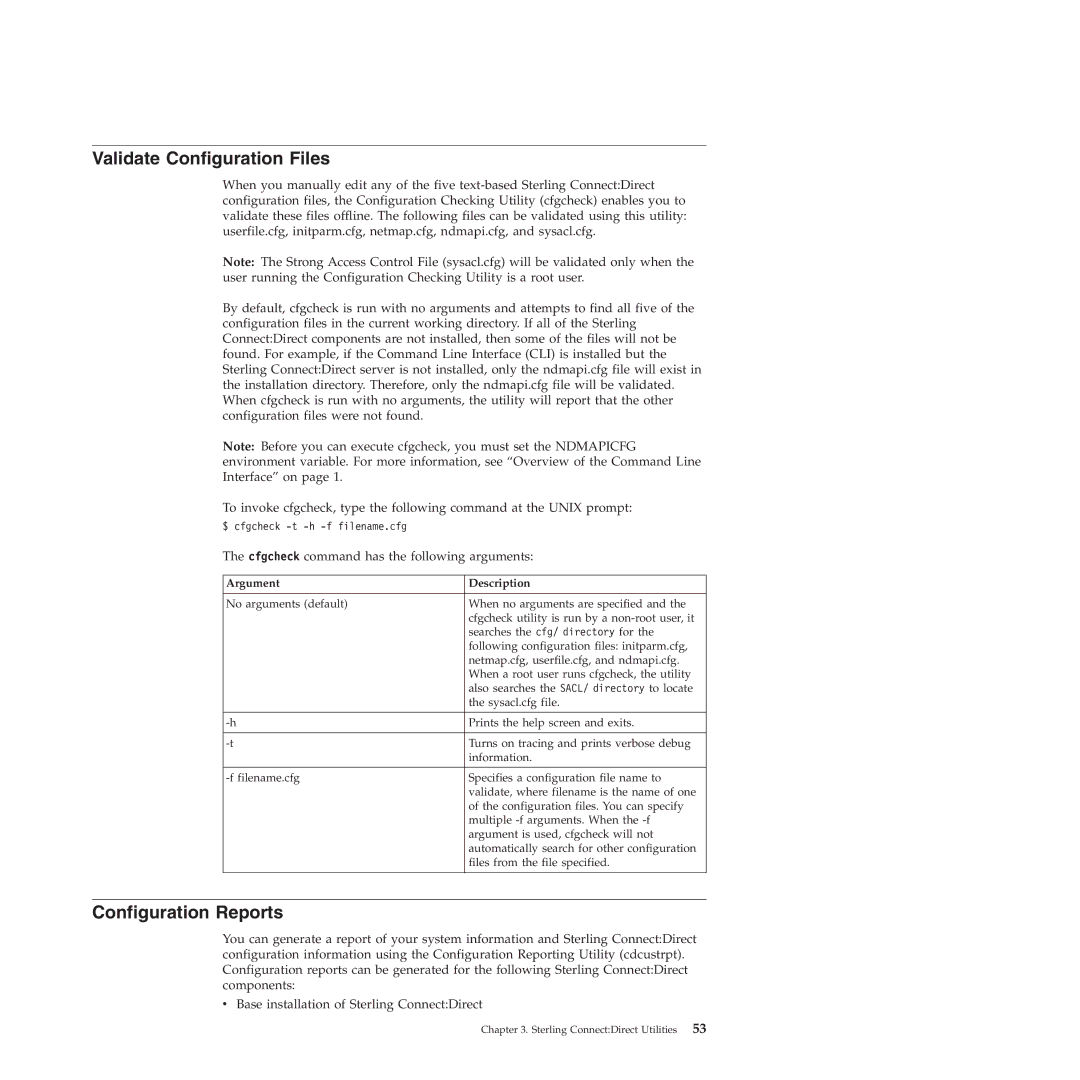User Guide
Page
User Guide
Copyright IBM Corporation 1999
Contents
Iv Sterling ConnectDirect for Unix User Guide
Stopping the CLI
Overview of the Command Line Interface
CLI Commands
Starting the CLI
Option Description Value Entry
Sample Command
Cdpnum
CLI Job Control
Command Abbreviation Description
CLI History Commands
Overview of Sterling ConnectDirect Commands
Command
Parameter Abbreviation
Abbreviations for Common Sterling ConnectDirect Commands
Parameter Description Values
Submitting a Process
Pname = A?PROD5
Parameter Description Values
Id , pswd
Username@hostname or user@localhost
Name nnnnn
Name host name nnn.nnn.nnn.nnn or
Snodeid field
Id ,pswd ,newpswd
Specify retain=initial
Following command submits the Process named copyfil
Following command submits the Process named payroll
Name generic list
Following command submits the Process named copy.cdp
Changing Process Parameters
Parameter Description Value
Node specification, userid generic list
Remote node specification generic list
Deleting a Process from the TCQ
Number list
Removing a Process from the Execution Queue
Stopping Sterling ConnectDirect
Flush process command has the following optional parameters
Parameter Description
Viewing a Process in the TCQ
Pname Locate the Process to view
EX HC HE HI HO HR HS PE
Monitoring Process Status in the TCQ
Following command displays the specified Process number
All
EX HC HE HI HO HR HS PE
Output from the command is displayed in the following table
Dest=/path/file name
Determining the Outcome of a Process
Record id list
Caev Capr CAEV, Capr
Parameter Description Value
Parameter Description Value
Parameter Description Value
Date day , hhmmss ampm
Srcf=/path/file name
Generating a Detailed Output Report for a Process
Recid LOG Timepname Pnumber Stepname Ccod Fdbk Msgid
Running System Diagnostics
Generating a Summary Report for a Process
Select Statistics
COMM.TRC
Smgr
Trace smgr pnode tnode=ath3500ry level=2 file=Smgp.trc
Scheduling Parameter Queue Comments
Command Definition
Overview of the Transmission Control Queue
Scheduling Sterling ConnectDirect Activity
Progression of a Process Through the TCQ
Execution Queue
Status Comment
Wait Queue
Element Comment
Hold Queue
Timer Queue
Held for Call indicates that the Process was
Creating a Translation Table
Introduction to Translation Tables
Example-Creating a Translation Table
Compiling a Translation Table Using the ndmxlt Utility
Example-Modifying a Model Translation Table
Using Translation During File Transfer Operations
Diagnostic Number Description
Translation Table Error Messages
Accessing Sterling ConnectDirect Messages
Message File Content
Following are the parameters for the message file record
Following is a sample ndmmsg command
Message File Record Format
Displaying Message Text
Sterling ConnectDirect for Unix User Guide
Memory-The amount
Using the Standalone Batch Compression Utility
Following are the parameters for the cdsacomp utility
Level-Compression level
Nnnnn
Source codepage, destination
Codepage
Example-Decompress a Text File
Example-Precompress a Text File
Example-Precompress a Text File With Codepage Conversion
Example-Precompress a Binary File
Examples-csdacomp Command Help
Argument Description
Validate Configuration Files
Configuration Reports
Cfgcheck command has the following arguments
Type the following command at a Unix prompt
Generating a Configuration Report on the Base Installation
Sterling ConnectDirect Utilities
Following example shows an excerpt from a sample report
Sterling ConnectDirect Utilities
Sterling ConnectDirect for Unix User Guide
Compiler version to use for each platform
Program using the C++ API calls
Introduction to Writing Custom Programs
Compiling Custom Programs
You want to create such as apicheck
Platform Compile Command
++ Function Description
Writing Custom C Programs
Ndmerrenth
Ndmerror
Ndmnoerror
Ndmapirecvrespc
Receiving Responses Using ndmapirecvresp or ndmapirecvrespc
Ndmapirecvresp or
Parameter Description Value
PNOD-PNODE
Truncated
Following is a sample ndmapirecvresp function
SNOD-SNODE
Return Code Description
Ndmapirecvresp or ndmapirecvrespc to retrieve
Selectstatistics or Selectprocess , the CLI
Writing Custom C++ Programs
Ndmapisendcmdc function call has the following return codes
Following is a sample ndmapisendcmd function
Sterling ConnectDirect for Unix User Guide
Cdfailure
Method Description Parameter Return Values
Cdsuccess = 0, Cdfailure =
Following is the ConnectDirectSession class header
Writing Custom Programs
Sterling ConnectDirect for Unix User Guide
Chown root exitskeleton
User Exit Programs
User Exit Functions
Program Description
Return Code
Goodrc Errorrc
Exitprogram
Waiting for a Message Using recvexitmsg or recvexitmsgc
Header
Following are the parameters for sendexitmsg or sendexitmsgc
File Open Exit Messages
Overview of User Exit Messages
Statistics Exit Message
Fileopenoutputreplymsg
Security Exit Messages
Validatemsg Validatereplymsg
Generatemsg
Exit Log Files
User Exit Stop Message
Copy Control Block
Copyright IBM Corp
IBM Corporation J46A/G4 Bailey Avenue San Jose, CA
Trademarks
Sterling ConnectDirect for Unix User Guide
Index Special characters
Generatemsg Generatereplymsg Validatemsg Validatereplymsg
Page
Sterling ConnectDirect for Unix User Guide
Page
Product Number 5725-C99

